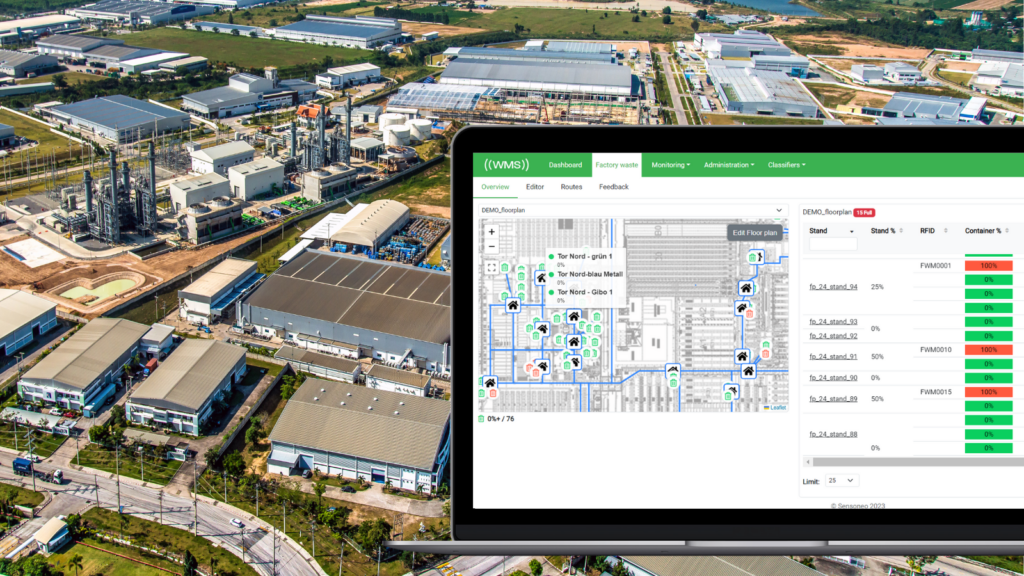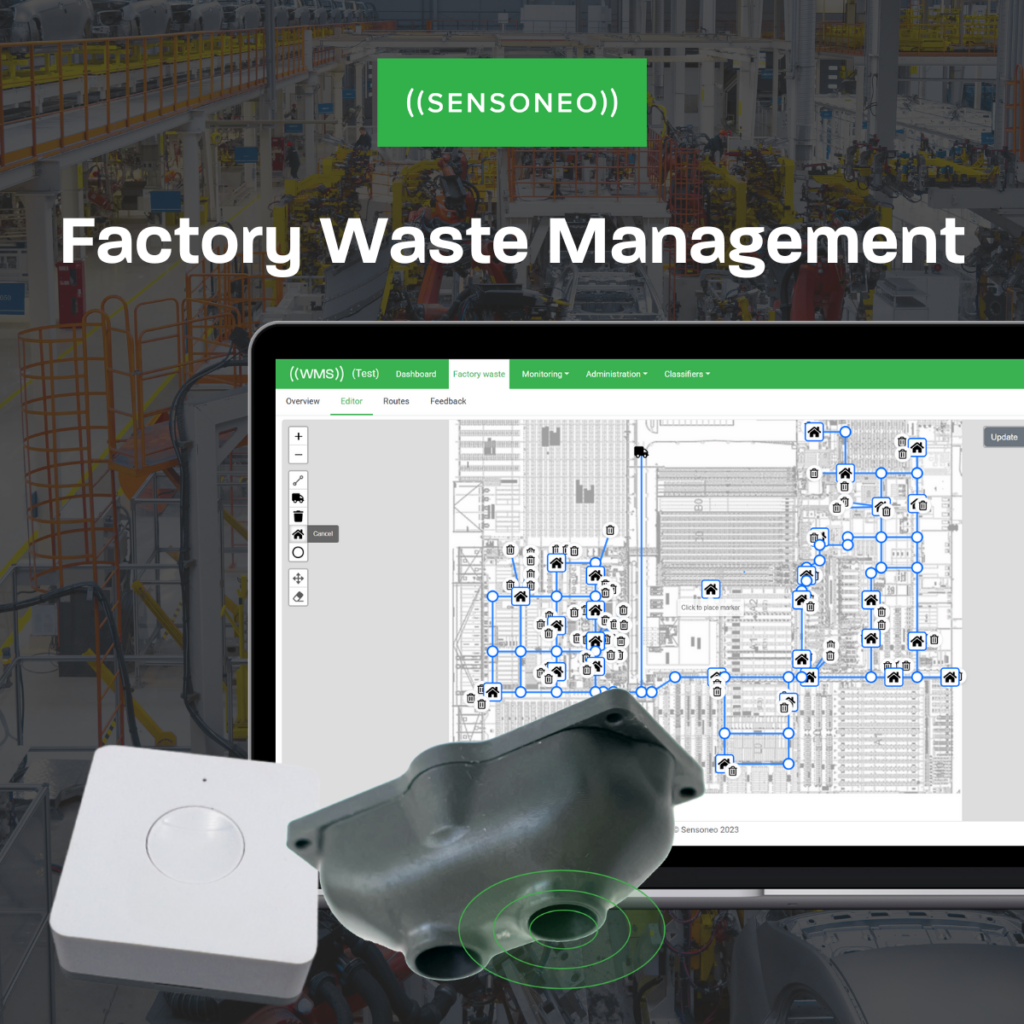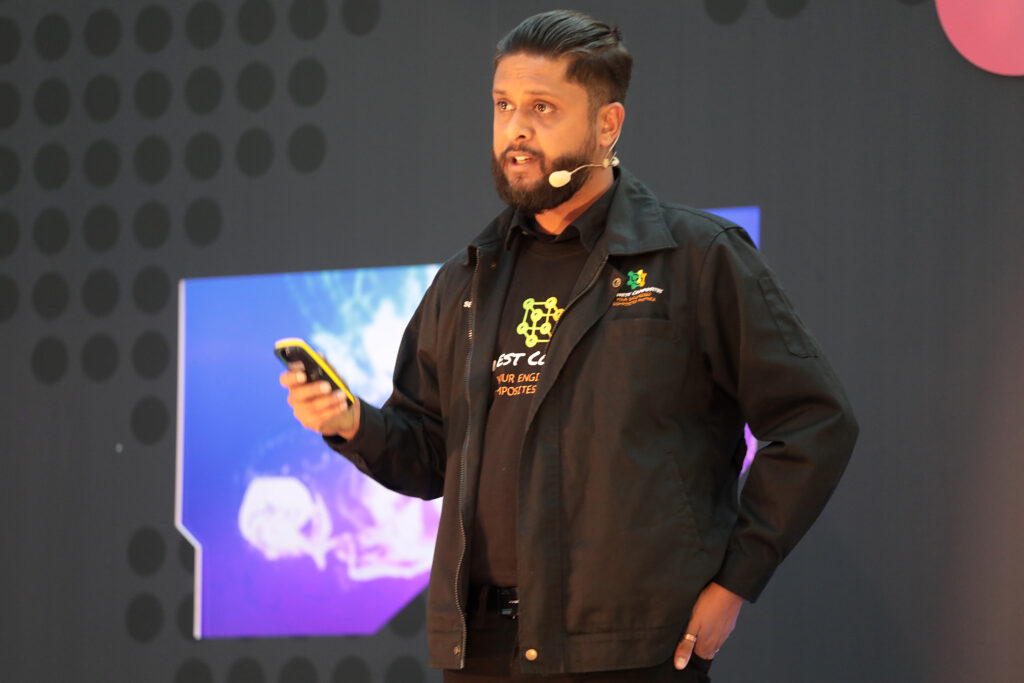
Foto : Frank Oppitz Photography
Sustainability and Circular Economy solutions are becoming increasingly important for startups worldwide. In North Rhine-Westphalia, Circular Valley and its Circular Economy Accelerator program play a key role in fostering innovation in this field by supporting startups that develop sustainable solutions to close resource loops and reduce waste.
It’s no coincidence that four startups from the Start.up! Germany Tour have already participated in the Circular Economy Accelerator program, including Midwest Composites from Malaysia, which took part in the 2024 tour. In this interview, we speak with Kai Pedina, Project Coordinator at Circular Valley about their mission, the support they provide, and what it takes for startups to succeed in the Circular Economy. Additionally, we hear from Sunil Raaj from Midwest Composites about their journey from the Start.up! Germany Tour to the Circular Economy Accelerator, their experience in the program, and their future plans for expanding into the German market.
Kai, can you give us a brief introduction to Circular Valley and its mission?
Circular Valley is driving the transformation from a linear to a circular economy, while economic growth and environmental protection go hand in hand. With its Circular Economy Accelerator program, Circular Valley supports startups from around the world from the initial idea to market entry and growth. Twice a year, 15 startups come to the extended Rhine-Ruhr region for several weeks to learn together, develop themselves and their companies, and connect with our partner companies.
Why is North Rhine-Westphalia an ideal location for fostering Circular Economy startups?
North Rhine-Westphalia has a strong industry and high-quality research institutions. Through Circular Valley's targeted support and networking of circular start-ups, the various players can work together on the transformation to a circular economy.
What kind of support do startups receive when joining the Circular Economy Accelerator?
After a start-up has successfully completed the application process and been selected as one of 15 start-ups, the two-month program begins, consisting of a digital phase and a presence phase. From the start of the program, we connect the participating start-ups with our partner companies and start-ups from previous batches. In a virtual kick-off, the startups and the representatives of our partner companies introduce themselves to each other in order to discover initial potential for collaboration and to get in touch with each other. In the virtual „Get To Know Your Batch“ event, the participating startups get to know each other better in order to identify possible synergies between the teams.
Regarding the presence phase, Circular Valley supports participating teams in the visa process and pays a certain part of the costs for travel, accommodation, and per diems. Following the digital phase, the presence phase marks the start of the core of our program. The program consists of various sessions such as Pitch And Reflect, Body Language, Business Model Coaching, How To Talk To Investors, Sales and Marketing, Social Media, Branding, Pitch Training, Kill Your Company, What To Know About IP, and Life Cycle Assessment. As part of the social programs, we visit exciting sights in North Rhine-Westphalia with the startups to highlight the attractiveness and special features of the region.
In addition, company visits take place at inspiring partner companies, and decision-makers from our partners answer questions from participating start-ups during hot chair sessions. The highlight of each attendance phase is the Demo Day, which is integrated into the Circular Valley Convention in the spring batch and the Circular Valley Forum in the autumn batch. On this Demo Day, start-ups have three minutes to present themselves and their ideas, and then ideally find partners or customers. At the convention and forum, participating startups get their own booths to connect with guests off stage. The Demo Day also marks the end of each batch, making the participating startups our alumni, whom we at Circular Valley are happy to connect with our partner companies and support individually even after their participation.
What are some of the biggest challenges Circular Economy startups face, and how does the Circular Economy Accelerator help overcome them?
For a circular economy, it is essential that a wide variety of players work together, and start-ups often find it difficult to get in touch with the right partners. By connecting the participating start-ups with our more than 160 partners from industry, R&D, and government, we want to create a win-win situation for both the partners and the start-ups.
Can you share a success story of a startup that has gone through the Circular Economy Accelerator program?
After Dr. Prateek Mahalwar participated in the second batch of our Circular Economy Accelerator program with his start-up BIOWEG in early 2022, a partnership was formed between BIOWEG and our partner company Bayer in November 2023 to develop new biodegradable seed coatings and formulation materials. Even after participating, Prateek and BIOWEG remained very connected to Circular Valley, which is why we invited him to exhibit with us at the Future Tech Fest in 2024. In addition, Prateek has been talking to participating startups at the beginning of the presence phases for several batches now about what they can expect from the program and how they can make the most of their time at Circular Valley.
Now to you, Sunil! How did your participation in the Start.up! Germany Tour lead you to join the Circular Economy Accelerator?
Our experience on the Start.up! Germany Tour was truly transformative. As a young startup, we are incredibly grateful for the opportunity to showcase our vision on an international stage, connect with industry leaders, and gain valuable insights that have shaped our growth. The tour’s focus on innovation and sustainability not only expanded our network but also introduced us to industry leaders dedicated to circular economy principles. It was through this program that we first encountered Circular Valley via Ljubitza Happe and Jan Turek, whose encouragement confirmed that our participation would be a perfect fit with their growing network of startups and partners, aligning seamlessly with our mission.
What has your experience with the Circular Economy Accelerator been like so far? How does it compare to other startup programs you have participated in?
The Circular Valley program has been an incredible journey. The mentorship, collaborative spirit, and hands-on resources have helped us navigate the unique challenges of circular business models. Compared to other startup programs, the Circular Economy Accelerator stands out for its strong emphasis on sustainable innovation and its deeply community-driven approach. The personal connections and relationships built during the three-week program in Wuppertal have been the cherry on top, making the experience even more impactful.
How has Circular Valley helped your startup grow and refine its circular economy approach?
Through tailored mentoring and strategic workshops, Circular Valley has empowered us to refine our processes and integrate more sustainable practices into our business model. The program’s hands-on approach to navigating and applying circular economy principles has also strengthened our ability to communicate our value proposition to eco-conscious investors and partners. Furthermore, its strong network of corporates and startups has opened the door to invaluable collaboration opportunities, further accelerating our growth and impact.
What are your next steps in expanding into the German or European market?
Our next steps focus on leveraging the insights and connections gained from both the Start.up! Germany Tour and the Circular Economy Accelerator to accelerate our expansion into key European markets. We are actively exploring strategic partnerships with both corporates and startups to enhance our product offerings while securing pilot projects that demonstrate the impact of our innovative circular solutions. Ultimately, our goal is to build a scalable model that aligns with European sustainability standards and meets the evolving expectations of eco-conscious consumers.
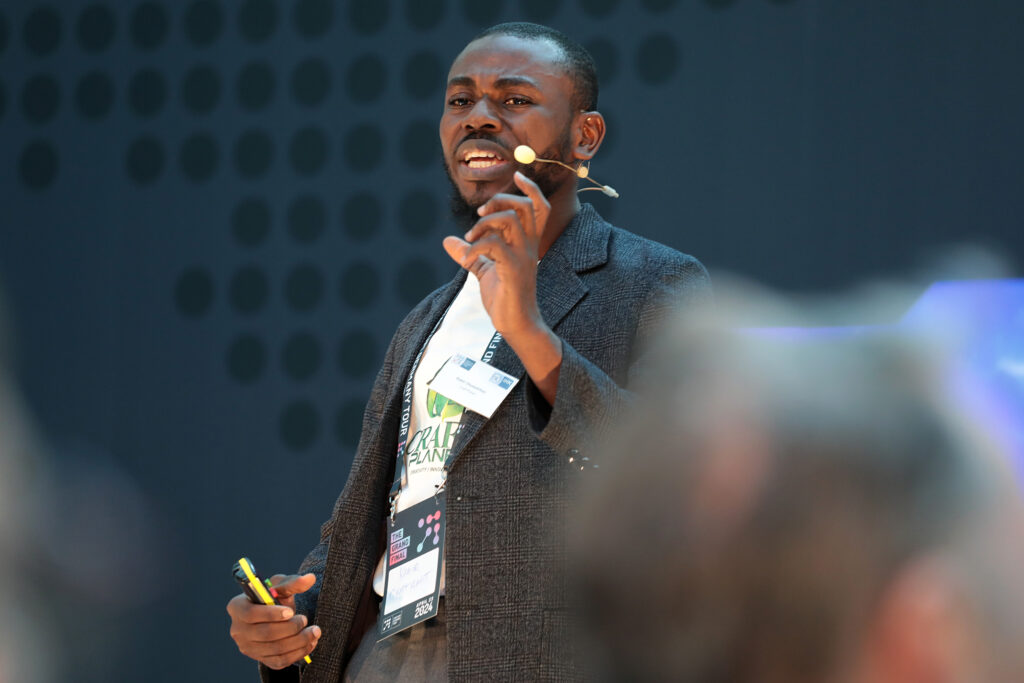
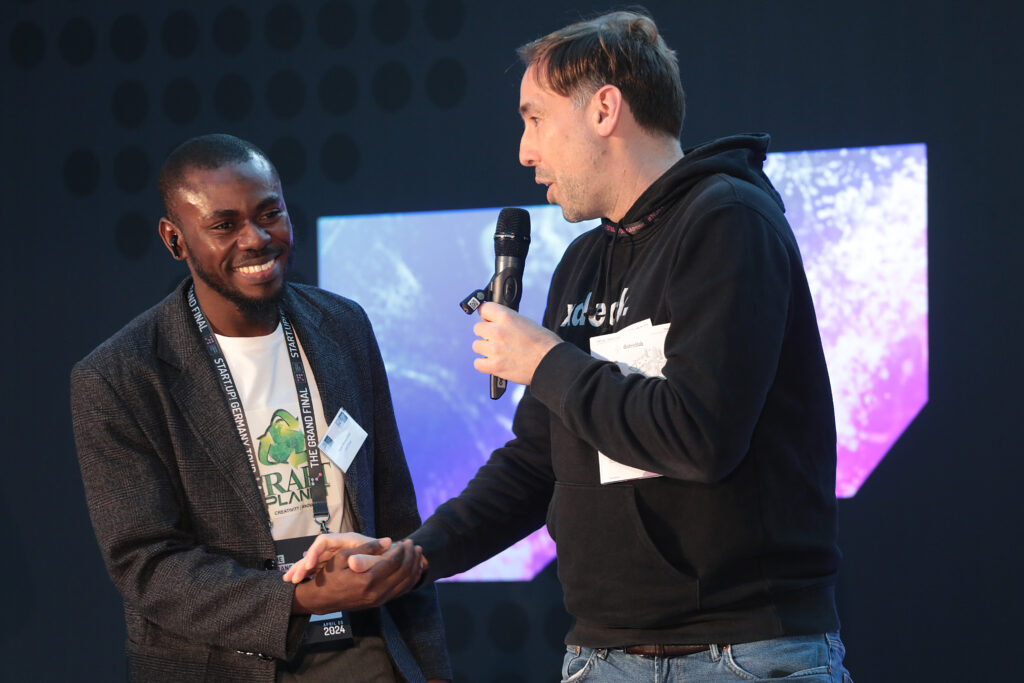
Kabir Olaosebikan is the founder and CEO of Craft Planet – a company from Nigeria which is a pioneer in transforming plastic waste into sustainable building materials and modular housing. They leverage innovative sand polymer technology and address the environmental challenges of plastic pollution while at the same time meeting the urgent need for affordable housing.
With this business idea he joined this years Start.up! Germany Tour and won the extra price for sustainability in the finals in April.
Being introduced to the very active startup ecosystem in our region he subsequently applied for Batch #7 of Circular Valley, a regional accelerator program dedicated to a circular economy. Already in August he returned to Germany to receive on of the coveted participation tickets to this falls` accelerator program.
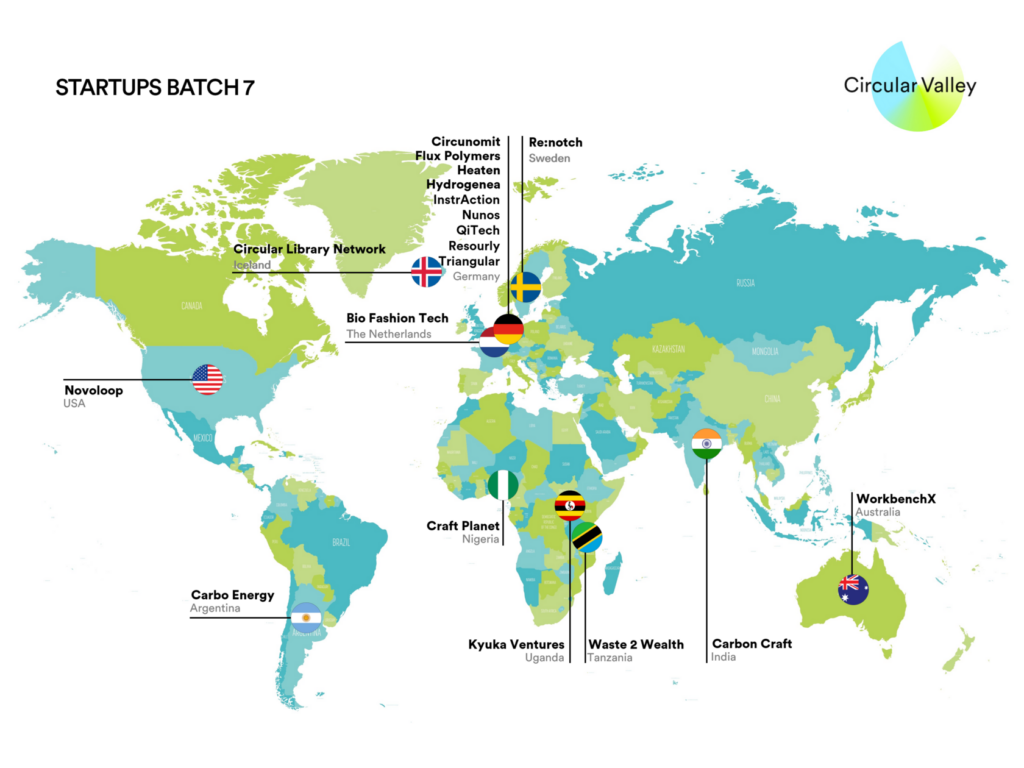
Now that he just returned to his home country, Nigeria, we are curious about all the experience he`s bringing back to his company and the added value he gained for the development on site.
In these days of a rapid development for Craft Planet, Kabir still found some time for us to answer the following interview questions:
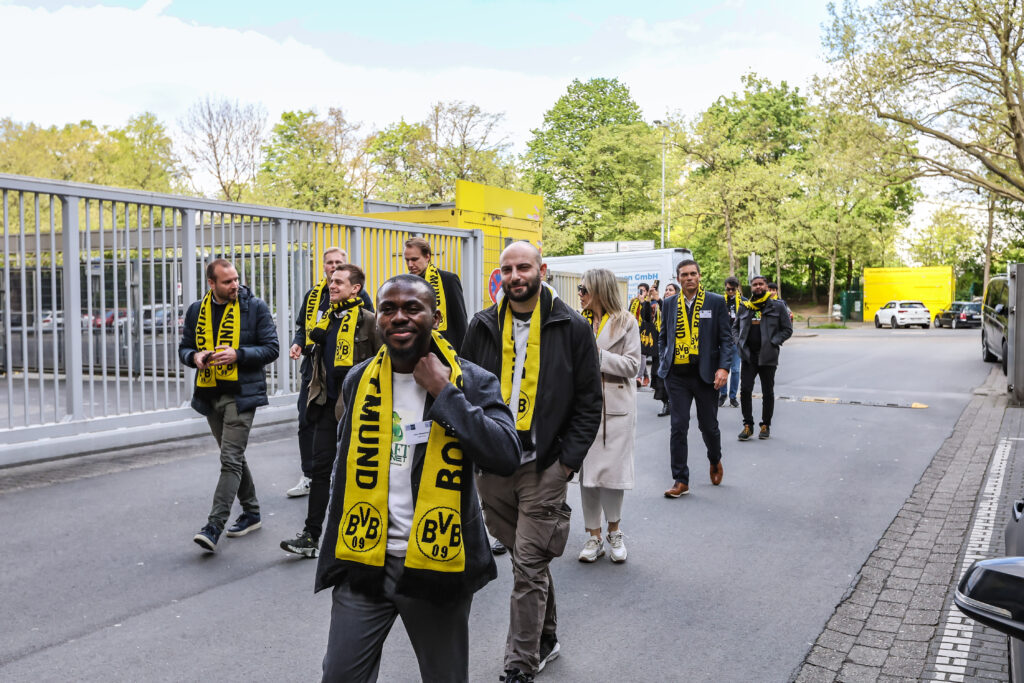
How did you get to know about the tour and who made you apply with your great sustainable idea to join in?
I was one of the top 10 GIZ fellows from Nigeria who spent 2 months in Germany, where I earned various certifications and recognitions. I learned about the Startup Germany Tour through GIZ, and they encouraged me to apply.
How did you like the content and information in the webinars? Was it helpful for your development?
The webinars were impactful, offering valuable insights that significantly contributed to my personal and business growth, helping refine our sustainable practices at Craft Planet.
What do you think about the 3-days program you joined here in Germany? What did you like best or what had the biggest effect for you? Which information was most important?
The 3-day program was incredibly enlightening. Networking with international startups and visiting potential business partners had the most profound impact, especially the information on scaling sustainable solutions in global markets.
How essential was the Start.up! Germany Tour for your personal and economic development, and how far did it pave the way into a next Accelerator program like the Circular Valley Accelerator?
The Startup Germany Tour was essential in securing a special opportunity mentorship from "Dr. Markus Gick; Managing Director at Xdeck GmbH" and the "Circular Valley opportunity". It significantly contributed to my economic development and provided key connections that are now helping to scale Craft Planet.
What would you tell other international startups who might be interested in the tour?
I would encourage other startups to apply. It’s an incredible opportunity to gain international exposure, build valuable partnerships, and accelerate business growth in a sustainable and impactful way.
And most important: What impact has your development by now on the aims and values of you and your startup?
The tour reinforced Craft Planet's values of sustainability, community empowerment, and innovation. Our development now aims at greater global impact, addressing climate change through eco-friendly housing solutions while supporting local economies.
All partners of Start.up! Germany Tour sent their congratulations and are very proud of having been able to support the development of such a promising talent.
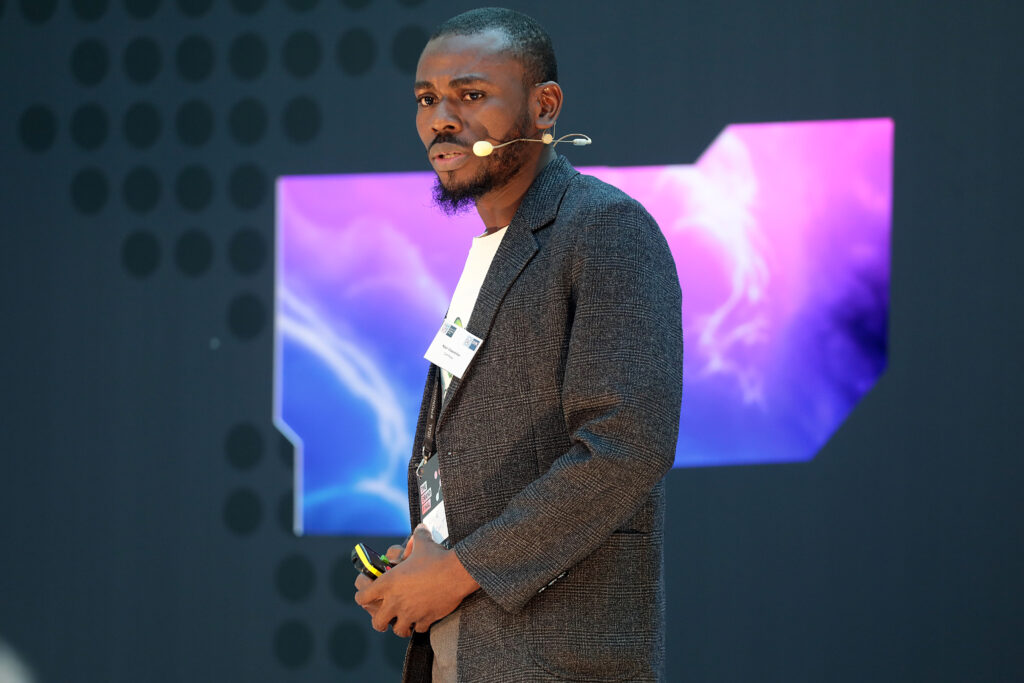
Dear startup Community, we are excited to explore the insights from our recent interview with Christoph Hering, Director Innovation Center at AHK Greater China. He sheds light on the vibrant Chinese startup ecosystem and its attractions for German companies while also highlighting the considerable interest of Chinese startups in the German market.
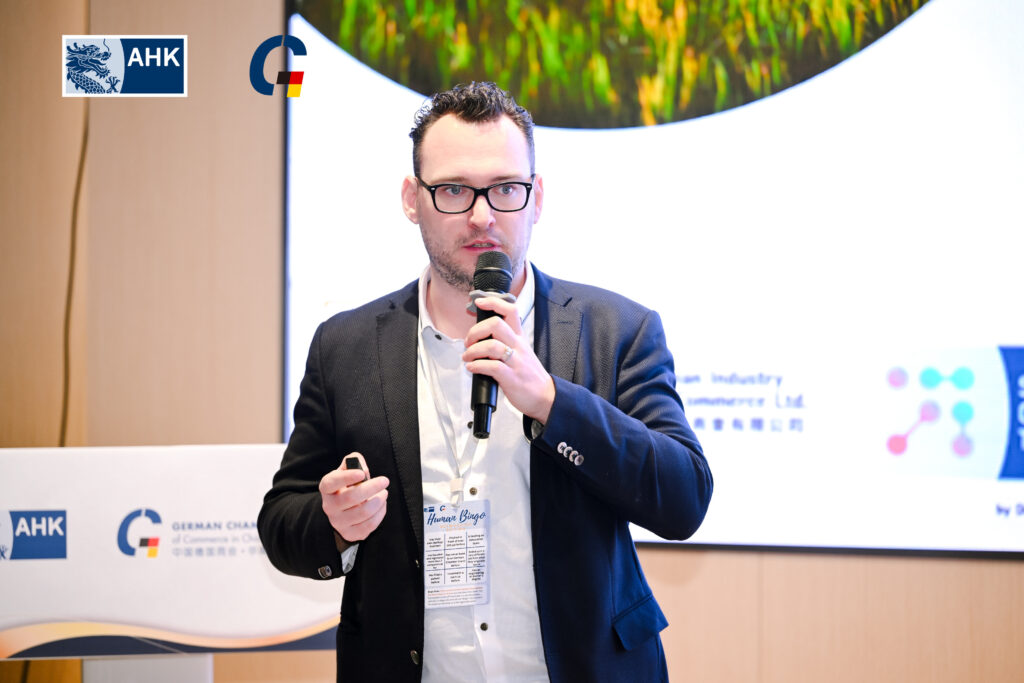
Christoph Hering at the AHK Innovation Night
Could you briefly introduce the AHK Greater China?
AHK Greater China is part of the German Chambers of Commerce Worldwide Network (AHK) which encompasses 150 offices in 93 countries and regions. As an official institution of Germany's foreign trade promotion, AHK Greater China has been representing the economic interests of German companies in China for over 25 years. The primary objective is to promote bilateral trade and investment between Germany and China by advising, supporting, and representing German companies looking to establish or expand their business presence in China. AHK Greater China’s main offices are located in Beijing, Shanghai and Guangzhou with seven more offices throughout the country.
Can you tell us something about the AHK’s involvement in the Start.up! Germany Tour?
Since 2019 AHK Greater China is part of the Start.up! Germany Tour (SUGT). We are responsible for the local selection of startups in China and Hong Kong. This year, 2024, we received over 50 applications from Chinese startups across different industries and sizes. We thoroughly reviewed all the teams and subsequently let the top 12 teams compete in a pitch competition. In the end, the team from “MechMind” in Beijing emerged victorious. In general, SUGT is a fantastic platform to get to know new innovative startups from various countries and regions. It also offers local startups the chance to introduce themselves to German companies, build new partnerships and potentially find customers or even investors.
How would you describe the Chinese start-up ecosystem?
The Chinese startup ecosystem, with its size, diversity, and innovative power, is a thrilling yet challenging prospect for foreign observers. The landscape can be likened to a jungle; success requires intense effort to penetrate the market. Many innovative startups remain under the radar, and without Chinese language skills and industry insights, discovery from the outside can be complex. Moreover, larger Western platforms such as techcrunch.com and LinkedIn are not prevalent in China, and Chinese startups are less likely to have websites or participate in international startup events, adding to their invisibility. Relationships and personal networks hold as much sway in Chinese startups as they do in business dealings, underlining the value of the right network partners and universities for gaining access.
The fact that only 3 to 4% of university graduates establish startups speaks volumes about the competition and financial struggles young founders face. Investors' high ROI expectations and risk aversion often lead to a landscape where the most successful entrepreneurs are in their mid-thirties to forties, armed with significant professional experience and robust personal networks. These founders, particularly those from large Chinese corporations like Alibaba and Huawei, can command vast startup capital and a ready customer base, often from their previous employers.
Chinese startups excel at rapidly transforming ideas into products and scaling existing products, driven by an impressive development speed. Innovation in China often involves multiple small adjustments to the product rather than massive breakthroughs. This agility and speed set Chinese startups apart, propelling their success on the national and global stages.
What makes the Chinese startup ecosystem attractive to German companies, and conversely, how does the German market appeal to Chinese startups?
The Chinese startup ecosystem presents several fascinating aspects for German companies. A notable facet is the rapid innovation speed of Chinese startups, which is largely due to their adoption of agile methodologies from the software sector. This 'fail fast forward' mentality, combined with excellent basic research and a worldwide lead in patenting new materials and processes, results in startups that are rapidly pushing the boundaries of technology. Furthermore, Chinese apps like WeChat, Dianping, and Meituan are fostering a significant digital shift. Through these platforms, Chinese startups can create and distribute new digitally networked products at a remarkable pace. This wealth of smart products interfaces with smartphones, providing German companies with a unique insight into the potential future of a digital society. However, the high competition level within China means that the successful startups are those that have not only managed to find a product-market fit but have also secured proper financing and developed strong teams. With the current economic downturn in China, these startups are now expanding into the global market, often outperforming local competitors in Southeast Asia, Latin America, and Africa.
On the other hand, the German market is appealing to Chinese startups as both an additional sales platform and a source of novel technologies. In addition to securing a larger market share, these startups are also looking to out-innovate their Chinese counterparts, using Germany's competitive tech environment to drive their own innovation. Germany is also popular for its good universities and central location in Europe. As a result, many Chinese startups choose Germany as their European headquarters. These benefits, however, come with the challenges of high employment costs, high taxes, complexity in bureaucracy, and sourcing suitable employees. The latter remains a significant obstacle, with many Chinese startups in Germany preferring to hire Chinese workers and German employees often leaving after a short tenure. Navigating these challenges is essential for Chinese startups wishing to establish a long-term presence in Germany.
In what ways do startups benefit from collaborating with AHK Greater China?
We offer a comprehensive network for Chinese startups to the German industry by helping them to win new customers, cooperation partners, and investments. Many of our members are actively looking for new partnerships and insights into the Chinese startup market. As AHK, we regularly organize events on the topic of innovation, host pitch events like SUGT, and provide a valuable networking platform. We are also in contact with several startups from Germany and China and invite founders as speakers for our events. In our Innovation Newsletter, we also regularly interview startups and present them. This year, 2024, we also offer a new program for AHK members, the AHK Innovators Club in China. In this program, we connect German companies with Chinese companies as mentor and mentee pairs to promote the exchange and innovative power of the participants. Thus, we offer Chinese startups a great opportunity to work with German companies, and for German companies to gain a better insight and understanding of the Chinese startup ecosystem.
About AHK Greater China
AHK Greater China is part of the German Chambers of Commerce Worldwide Network (AHK) which includes 150 offices in 93 countries and regions. As an official institution of Germany’s foreign trade promotion, AHK Greater China has been representing the economic interests of German companies in China for over 25 years. Its primary objective is to promote bilateral trade and investment between Germany and China by advising, supporting, and representing German companies seeking to establish or expand their business in China.
With main offices in Beijing, Shanghai, and Guangzhou and seven more offices throughout the country, the widespread presence enables the AHK to offer deep insights into the local business environment. The team of over 130 specialists are experts in their fields and have years of experience in helping German companies navigate the complexities of doing business in China.
Start.up! Germany Tour interviews Florian Schnitzler, Head of the Startup Unit at the state’s trade and investment agency NRW.Global Business, to discuss what makes North Rhine-Westphalia (NRW) an ideal destination for startups. Florian highlights the state’s vibrant ecosystem and introduces the new Startup Welcome Package, designed to support international tech companies entering the German market.
SUGT: What makes NRW such an attractive destination for startups?
Florian: NRW is a key hub for startups in Europe, offering significant advantages. The state’s central location in Europe and its extensive infrastructure provide access to over 160 million people within a 500-kilometer radius. This proximity to a large consumer and business market is a major advantage. NRW also boasts a robust business environment, with over 700,000 SMEs and more than a third of Germany's top 50 revenue-generating companies. These companies are actively seeking partnerships and innovation, particularly in areas like digitization or the climate-neutral transformation of our economy. Another key factor is the talent pool. With nearly 70 universities and more than 700,000 students, NRW offers startups access to a steady pipeline of skilled professionals. This combination of market access, business opportunities and talent makes NRW an excellent location for innovative companies. Nearly 20 percent of all German startups are based here, supported by vibrant ecosystems such as the DigiHubs in cities like Düsseldorf, Bonn, Aachen, Münster and Essen. These hubs bring together startups, corporates, investors and academic institutions, fostering collaboration and growth.
To further support international startups, the state of NRW has introduced a new "Startup Welcome Package", a grant designed to make it easier for startups to enter the German market and establish themselves in the state.
SUGT: That sounds compelling! What are the key features of the Startup Welcome Package?
Florian: The Startup Welcome Package is designed to help international startups expand into Germany from a base in NRW. It provides a 10,000 euro grant that can be used to cover key needs such as renting a coworking space in NRW for at least 90 days. It also includes funding for tailored consulting services, including B2B support, tax and legal guidance, mentoring and coaching etc.. The package is intended to ease the transition for startups entering the German market and help them integrate into NRW’s business ecosystem.
SUGT: What are the eligibility criteria for this grant?
Florian: To qualify, startups must be international tech companies that are less than ten years old, employ fewer than 250 people and generate annual revenues of less than 50 million euros. The startup must also be registered in its home country and not yet registered in Germany at the time of application.
SUGT: Let’s say my startup meets all these criteria. What happens next?
Florian: Your startup should get in touch with NRW.Global Business so that we can explain the details of the grant and answer any questions. After that initial consultation, we will provide the company with the application forms.
The application process focuses on several key factors. We assess the degree of innovation and scalability of the business model, the potential positive impact the company could have on NRW and its alignment with the state’s sustainability goals. Additionally, we consider whether the startup has a long-term strategy for operating in Germany and specifically in NRW.
There is no fixed deadline for applications as the program operates on a “first come, first served” basis. We encourage startups to apply early to secure their spot.
SUGT: How does NRW.Global Business ensure startups are well-integrated into the local ecosystem?
Florian: Our approach is highly collaborative and integration into the local ecosystem is a priority for us. The choice of the coworking space where startups begin their journey in NRW plays a vital role as it provides numerous opportunities for connections and collaboration. Moreover, NRW’s strong networks, excellent universities, diverse funding opportunities and resources such as the DigiHubs, accelerators and incubators create a supportive environment where startups can thrive. In addition, we facilitate networking through platforms such as NRW.Global.Connect, which helps startups meet potential partners, clients and investors.
Events like the Future Tech Fest in Düsseldorf, Hinterland of Things in Bielefeld and of course, the Startup Germany Tour further enhance these connections, offering startups exposure to the wider community and the chance to engage with industry leaders.
SUGT: What kind of startups would benefit most from expanding to NRW?
Florian: While NRW welcomes startups from all sectors, we have seen particularly strong growth in areas such as digital technologies, medtech, energy solutions and logistics. Initiatives like Scale-up NRW are tailored to support startups that are ready for international expansion, making NRW especially attractive for companies in advanced growth stages.
To name a few success stories: Companies like DeepL from Cologne and Trivago from Düsseldorf started here and have since achieved global recognition. Similarly, emerging startups like Incoretex, Accure, Cureosity or Dabbel are making impressive strides from their bases in NRW. These examples highlight the potential of NRW as a launchpad for innovation and growth.
SUGT: Finally, what is your message to startups considering NRW as their next destination?
Florian: If you are looking for a location with dynamic markets, top-notch infrastructure and comprehensive support for your growth journey, NRW is the easiest way to get big in Europe. NRW – or as we like to call it “Europe’s Heartbeat” – is pulsating: geographically, culturally, economically. We can give your startup ideal conditions to grow your innovation in the European market. Our Startup Welcome Package is just the beginning of how we can help you achieve your vision.
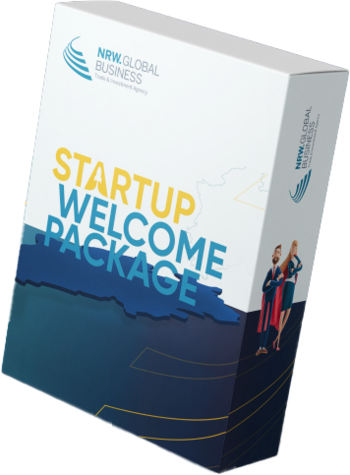
Information
Applications for NRW’s Startup Welcome Package are open! Contact Florian Schnitzler at startup@nrwglobalbusiness.com to get started!
Further information can be found here.
The Start-up Germany Tour (SUGT) is a unique platform that brings together established companies and emerging start-ups to foster innovation and forge partnerships. This year, we are particularly excited about the inspiring success story of the collaboration between VAHLE and ELONROAD, which began at SUGT 2021 and continues to this day.
The VAHLE Group is a leading global supplier of power, data transmission and automation systems for mobile industrial applications. With more than a century of experience and a team of more than 750 employees, VAHLE has established its products and services in 52 countries worldwide. The meeting between Vahle and ELONROAD at SUGT was a pivotal moment. To gain a deeper insight into the successful partnership between Vahle and ELONROAD, we spoke to Jaroslaw Warzecha, Operations Manager Systems Business at VAHLE.
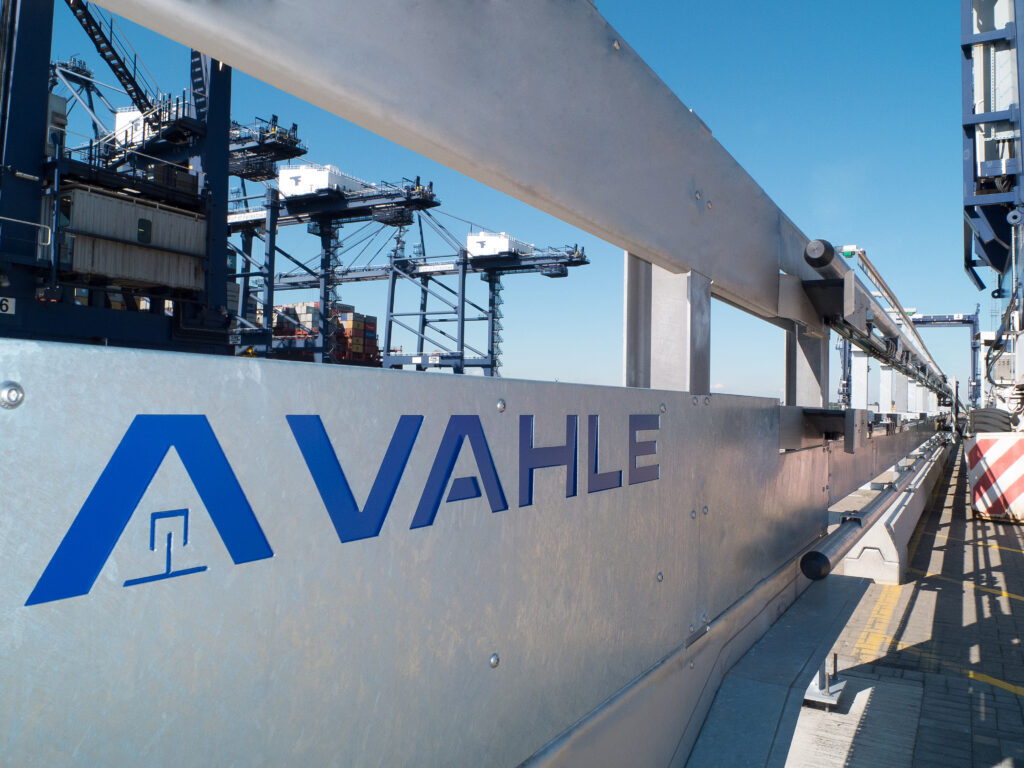
Why did you attend the SUGT as a spectator?
"Originally, we were looking for new ideas and innovative approaches for our products and services in 2019. The SUGT seemed to be the ideal platform to network with the emerging startup scene and find potential cooperation partners. After our first participation we continued every year."
Why are you interested in (international) start-ups?
"International start-ups often bring fresh perspectives and innovative solutions that are of great value to our industry. Their agility and creativity can help challenge traditional approaches and show new ways forward.”
How did you get to know ELONROAD - what was so exciting about this start-up for you?
"ELONROAD immediately caught our attention at SUGT, 2021. Their vision of equipping roads with intelligent conductor rails for electrification perfectly matched our interest in innovative energy systems. Their concept was not only technologically fascinating, but also promised to offer a sustainable solution for the mobility of the future.”
What have been the subsequent joint activities? Where are the points of contact?
"After our first meeting at SUGT, we undertook numerous activities with ELONROAD. From visits to Sweden to joint appearances at exhibitions, we have worked intensively together to develop innovative solutions and shape the future of mobility. The main points of contact have been our common interest in sustainable technologies and the electrification of transport routes.”
What's next for your joint story?
"We are currently working on an exciting project that will bring our shared visions to life. Details will be announced soon, but we can already say that it will be another important milestone in our cooperation.”
The story of VAHLE and ELONROAD is an inspiring example of how the Start-up Germany Tour brings companies and startups together to shape the future. We would like to thank Jaroslaw Warzecha for his insights into the fascinating development of the partnership between VAHLE and ELONROAD. Their collaboration is a shining example of how the SUGT brings companies and start-ups together to shape the future. We encourage other companies to join the Startup Germany Tour 2024 and take advantage of the opportunities that cooperation with startups offers.
Learn more about ELONROAD
Since the first electrical vehicles entered the market more than a decade ago, the question on everyone’s minds has been – ”How far can you drive?” Batteries are expensive and take up a lot of space. Batteries, costly yet pivotal, create a barrier to widespread adoption. At Elonroad, we're determined to change this narrative.
In the heart of innovation, inspiration often strikes unexpectedly. For our founder, Dan Zethraeus, that moment of insight came on a snow-laden road. A radical idea crystallized as slush accumulated between the wheels: "Could we charge electric vehicles differently?" Armed with a basic understanding of electrical engineering and boundless imagination, Dan embarked on a journey redefining transportation as we know it.
"It got me thinking," recalls Dan, his eyes alight with passion. "Perhaps you could build a rail there to conduct electricity under my car?" With a handful of Lego bricks and a mind buzzing with possibilities, he created the first prototype.
At that moment, our electric road system was born, transcending the limitations of conventional charging stations.
Our story is not just about wires and circuits; it's about inspiring change.
Learn more about the VAHLE Group
The VAHLE Group develops high-quality energy, data transmission and automation systems that are used in mobile industrial applications worldwide. Quality, dynamism, innovation and passion are the cornerstones of our actions. In 1912, Paul Vahle launched the first copper conductor rail on the market, laying the foundation for a company that today has over 750 employees and offers its products and services in 52 countries worldwide. In addition to our headquarters in Kamen, with production and development facilities, we develop new automation solutions at our competence center in Schwoich (Austria). Our portfolio includes products from the fields of energy transmission, data communication, positioning and control. Our flexible solutions are primarily aimed at customers in the automotive, intralogistics, port technology and crane technology sectors.
The Start.up! Germany Tour presents a unique and invaluable opportunity for startups by providing a platform to connect with potential partners and investors. On the flip side, it also offers established corporations the chance to learn from, exchange ideas with, and network within the vibrant startup scene. Such synergies are also harnessed by Evonik, a well-established name in the specialty chemicals industry. We had the opportunity to interview Viviane Winter, who works in digitalization strategy at Evonik, and gathered some exciting insights to share with you.
Stay tuned for an engaging behind-the-scenes look at Evonik's experiences as part of the Start.up! Germany Tour.
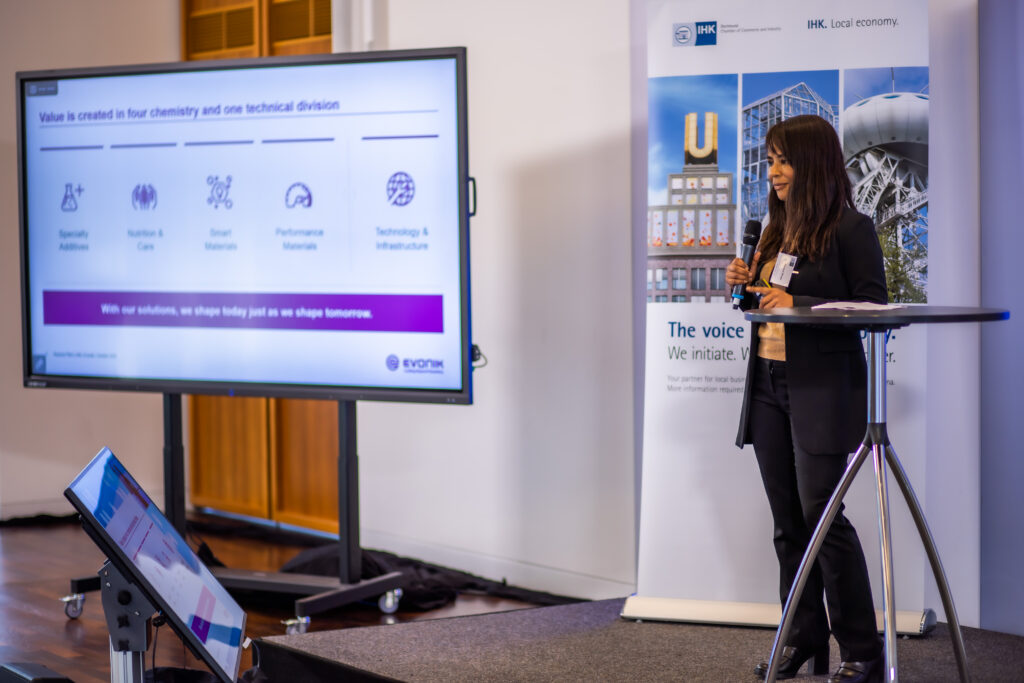
Viviane Winter at the Reverse Pitch of the Start.up! Germany Tour 2022
What drew Evonik to participate in the Start.up! Germany Tour?
As an innovation unit at Evonik, our objective is to cultivate a broad ecosystem for collaboration. The Start.up! Germany Tour facilitates this by connecting us with diverse startups from various sectors. The innovative ideas and trends emerging from the startup scene greatly inspire us. Particularly, the international scope broadens our perspective, inviting fresh insights and fostering productive cross-cultural interactions, which is a vital aspect of our participation.
How does Evonik benefit from collaborating with startups?
Startups are known for their fresh, innovative approach and their ability to think out of the box. Collaborating with startups offers us a unique advantage in exploring new horizons. Furthermore, it also makes sense in an economical way for both sides in case that the use cases match. Startups, with their flexible approach, can bring a novel perspective to our established processes. These collaborations bring value to our work by offering cost-efficient opportunities to work on innovative projects and the startups get the chance to gain insights into how we as a corporate work.
What areas are of particular interest to Evonik when collaborating with startups?
We're interested in startups playing in the field of (generative) AI in chemistry, e.g. to support lab work and to shorten innovation cycles by using data. The areas of sustainability and circular economy also show promising opportunities for collaboration with startups. Ultimately, the relevance of the use-case presented by the startup decides the potential for collaboration.
How does the Start.up! Germany Tour enhance the partnership between Evonik and startups?
Personal contact is a crucial element in nurturing collaborations. The Start.up! Germany Tour offers a platform where corporates can engage face-to-face with startups, paving the way for effective communication and deeper understanding. This allows us at Evonik to build fruitful collaborations by connecting directly with startups that have relevant use-cases. It also presents an opportunity for startups to network and learn from industry veterans. Once we have established a personal connection, startups can reach out to me, for instance, via LinkedIn. But it's essential that I've had the chance to form an impression of the startup and that we've already exchanged first ideas.
NRW is located in the middle of Europe and is the most populous and one of the most densely populated of the 16 federal states of Germany. The most important metropolitan area is the Rhine-Ruhr area with more than 10 million inhabitants. The cluster policy of the state government of North Rhine-Westphalia promoted the cooperation of companies, research institutions and the public sector along value chains in the most important sectors and technology fields.
NRW - Business location figures
Main facts about NRW as a business location
- 18 million inhabitants (21,5% of Germany)
- 710,000 small and medium-sized enterprises (KMUs)
- every fourth market leader comes from North Rhine-Westphalia
- In 2022, 20.5% of the gross domestic product was generated in NRW with € 793.8 billion
Detailed facts about NRW as a location for life science
10. 8% of the total German turnover of the biotechnology industry is generated here by 118 core biotechnology companies with more than 5,780 employees. In addition, NRW has the largest number of biotechnological patent applications in Europe.
More than 500 life science companies, including 118 with a proven focus on biotechnology, mark the country as a leading innovation centre in Europe.
NRW also has the highest density of scientific and top research institutions in Germany. The scientific landscape in the field of biotechnology in NRW comprises 56 universities and non-university research institutions.
In the academic year of 2019/2020 40% of the students in NRW studied one of the STEM subjects (natural sciences, technology, engineering, mathematics). In the field of biotechnology, students can specialize in cell biology, (bio) medicine, biochemistry, genomics, proteomics, metabolomics, molecular biology, systems and synthetic biology, analytics/ microsystems, bioinformatics, and process engineering.
In addition, 14 Clusters of Excellence in Germany are funded in NRW. Among them are five that deal with topics in the field of the bioeconomy or life sciences. In addition to the highest density of universities in Germany, the four major German research organizations (the Fraunhofer-Gesellschaft, the Helmholtz Association, the Leibniz Association, and the Max Planck Society) operate here.
NRW as a business location for the life sciences
Fixed elements of NRW corporate landscape are internationally established giants such as the biotechnology companies Qiagen and Miltenyi Biotec or Bayer, UCB, Henkel and Evonik Industries from the pharmaceutical and chemical industries. In addition to these global players, NRW is home to dynamic small and medium-sized enterprises (SMEs) such as AiCuris, Biofrontera, Paion, Sartorius Xell, ProtaGene, Lead Discovery Center, Taros Chemicals, Chimera Biotec and many others.
Large companies and SMEs are complemented by numerous young start-ups such as Numaferm, Priavoid, b. fab, SenseUp, Bex-Biotec: this small selection shows the innovative power of North Rhine-Westphalia as a biotechnology location.
NRW - Growth-promoting environment
Founders have many opportunities to exchange ideas with like-minded people and potential business and cooperation partners. Numerous advisory services and accelerator programs in NRW offer support.
Here are just a few of the offers in NRW:
BIO NRW
BIO. NRW is a central catalyst for the sustainable development of the strengths of North Rhine-Westphalian biotechnology and bioeconomy. The key aspects of BIO. NRW are: Effective network for scientists, founders and entrepreneurs, Central platform for life science topics, promotion of students and young talents, and support for start-ups and SMEs in financing and internationalization.
BioIndustry
Service association with international standards
BioIndustry e.V. is a networked and integrated service cluster of companies, research facilities, training and further education institutions, technology centers, biotechnological service companies and municipal economic development agencies with a focus on the Ruhr region and Westphalia.
MEDECON Ruhr
MedEcon Ruhr is the network of the healthcare industry in Germany's largest conurbation, the Ruhr healthcare metropolis.
More than 170 companies and institutions from the hospital industry, healthcare and healthcare research as well as the supplying industries are connected through their membership in MedEcon Ruhr association.
ZENIT
On behalf of the EU, the federal government and the state, Zenit, with more than 60 employees, supports small and medium-sized technology-oriented companies in their innovation and internationalization activities and brings together potential partners from industry and science. But start-ups, fast-growing and large companies are also part of our customer base. Technology and knowledge-based start-ups are important drivers of innovation in the digital transformation, life science and circular economy. ZENIT provides support in the areas of market access, business model validation, financing, human resources and internationalization. Topics that the start-up team at ZENIT has competently covered for many years. For start-ups that want to establish new ideas and innovations in the market, the team offers a variety of tools and methods.
Innovation competition “Gesünder.IN.NRW”
The innovation competition “Gesünder.IN.NRW” focuses on funding innovative solutions in the knowledge- and research-intensive fields of cutting-edge medicine, medical engineering, life sciences, nutritional science, and pharmacy. The aim is to promote a climate-friendly, environmentally friendly, and resource-conserving health care and health economy in NRW.
Funding is provided for research, innovation, and development projects with a focus on three priority topics, including innovative medicine and life sciences, health, and nutrition. Creative concepts and ideas are being sought that provide disease prevention solutions and new treatment options – using digitalization and biotechnology tools as important key and interdisciplinary technologies.
Many of today's successful young biotechnology companies started out as university spin-offs. NRW has numerous technology and start-up centers, some with different focal points. A total of 155 biotech and life science companies are currently located in 22 of them.
These “incubators” for start-up companies are usually located near research institutions and aim to provide an efficient infrastructure for the transfer of scientific know-how into marketable products and processes. Just to name some of them: BioMedizinZentrumDortmund, LSC-LifeScienceCenter Düsseldorf, BioCampus Cologne, Pharma- und Chemiepark Wuppertal or BioZ-Biotechnologiezentrum Münster.
“Next to the major players, it’s especially the start-ups and SMEs that develop new processes and products to help shape and manage the resource transformation. This in turn contributes to North Rhine-Westphalia’s continuing success as a leading industrial region.” (Mona Neubaur, Minister for Economic Affairs, Industry, Climate Action and Energy of the State of North Rhine-Westphalia)
NRW as a place for life science start-ups
NRW is the right location for any company, but especially for international companies that want to expand or establish themselves in new markets.
The location has a network of great partners who share their access, resources and knowledge in their respective networks. When it comes to financing, NRW.BANK is one trusted source of funding in NRW.
In addition to the strong chemical and pharmaceutical industries, numerous successful start-ups and spin-off companies thrive in NRW. This entrepreneurial excellence is supported by the densest network of academic institutions in Europe.
To promote start-ups from universities, the Ministry of Economic Affairs, Climate Protection and Energy of the State of North Rhine-Westphalia supports the Exzellenz-Gründerzentrum.NRW. The initiative aims to strengthen the start-up culture and thus improve technology transfer. Six universities receive 150 million euros in funding over five years, just as the Center für Entrepreneurship & Transfer in Dortmund.
In addition to that there is a rich and solid funding environment to support and promote the industry, including venture capitalists and business development agencies. North Rhine-Westphalia is becoming an increasingly attractive destination for startup financing! According to the EY Startup Barometer Germany from July 2023 (EY Startup - EY Startup-Barometer Germany – July 2023), NRW ranks third in the number of financing rounds nationwide behind Berlin and Bavaria, with 13% of all financing rounds in Germany taking place in NRW.
Even more impressive, NRW is one of the few federal states that has increased the number of financing rounds in the first six month of 2023 compared to the previous year. Additionally, in terms of financing volume, NRW ranks a strong fourth behind Berlin, Bavaria, and Hamburg. These figures are a testament to the growing ecosystem for startups in North Rhine-Westphalia and the state's commitment to investing in innovation.
Many start-ups also benefit from the technology or start-up centers in NRW. Business incubators act as a catalyst for economic development and promote the transfer of technology from idea to market. They promote business start-ups and subsequently support them to ensure their survival and growth. The specific services provided by the centers include providing affordable laboratory and office space, arranging business contacts, advising on financing options and providing advice on setting up or relocating a company.
NRW is not only the most populous and economically strongest federal state in Germany, but also offers an excellent transport infrastructure that connects all major European markets. Whether by road, rail, water or air, NRW offers you optimal transportation options for your goods and services.
As a center for innovation and digitalization in the logistics sector, here you will find qualified specialists, renowned research institutions and strong networks that will help you to optimize your processes, reduce your costs and increase your competitiveness.
NRW's geographical location, technological expertise and economic dynamics make it an ideal logistics location.
Nine top logistics companies have their headquarters in NRW (including Deutsche Post DHL, Rhenus, FedEx, Arvato, Schenker AG)
NRW - Business location figures
Main facts about NRW as a business location
- 18 million inhabitants (21,5% of Germany)
- 710,000 small and medium-sized enterprises (KMUs)
- every fourth market leader comes from North Rhine-Westphalia
- In 2022, 20.5% of the gross domestic product was generated in NRW with € 793.8 billion
Detailed facts about NRW as a business location for logistics
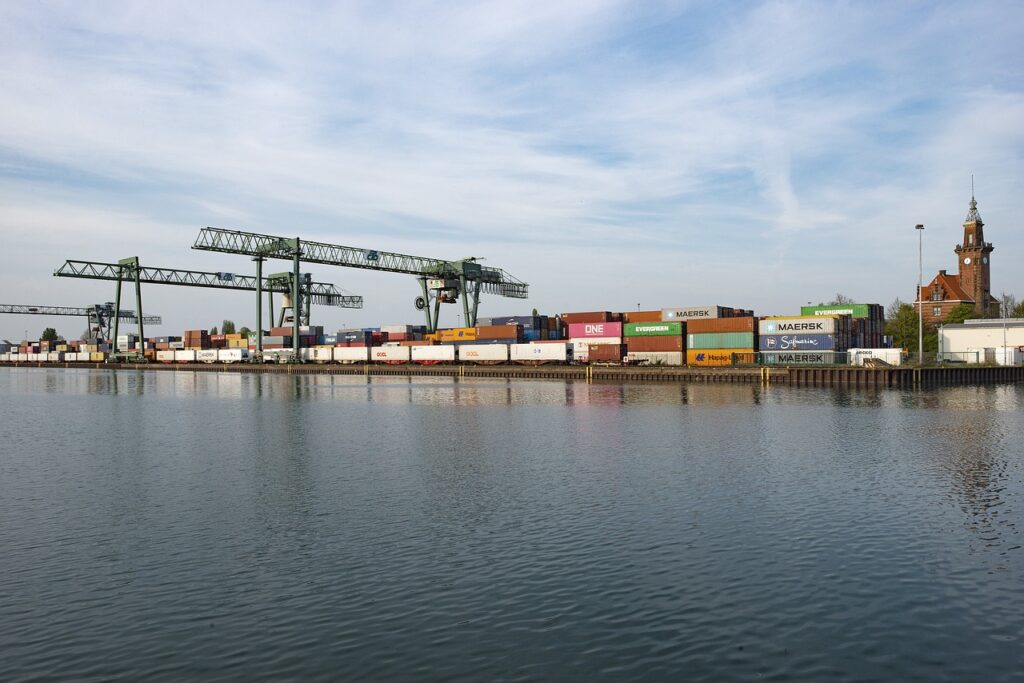
The state also has around 720 kilometers of waterways and 120 inland ports that handle a good 115 million tons of goods every year. The Port of Duisburg is the world's largest inland port and Dortmund is home to Europe's largest canal port.
Nowhere else in Germany is the highway network as tightly knit as in NRW. With almost 150 million consumers within a radius of around 500 kilometers, logistics reaches around a third of the EU population within a daily truck distance.
Around 24,000 logistics companies based NRW generate an annual turnover of approx. 67 billion euros. Almost 350,000 people are employed in the core logistics sector. If other logistics sectors are included, the figure rises to 712,000.
In 2014, the World Bank named Germany the most efficient logistics location in the world for the first time. In 2016 and 2018, Germany was again ranked first in the “Logistics Performance Index”. In the accompanying global survey “Connection to Compete”, freight companies and express carriers chose Germany as number one among 160 countries. With this award, however, they paid special tribute to North Rhine-Westphalia, the leading location for logistics in Germany.
NRW is also a focal point for start-ups. Here you will find numerous start-up companies developing innovative solutions for the logistics industry. NRW has already been able to attract 20% of all start-ups active in Germany, delivering even more radical innovations to the local industry and enabling local companies to take full advantage of the practical insights and modernization associated with the start-up scene.
NRW- Improvement through education and research
In addition to space, NRW offers great scientific and research institutions that promote innovation and a highly qualified talent pool in the region. For example, RWTH Aachen University, TU Dortmund University, Neuss University of Applied Sciences, the University of Duisburg-Essen and TU Cologne train their students in various areas of logistics. A wide range of different degree programs and training occupations in the field of logistics in NRW ensures that the industry benefits from new theories.
NRW is home to a number of important research institutes and chairs dealing with the subject of logistics. Around 4,800 students are enrolled in the 45 logistics courses in NRW including technical logistics, digital logistics, trade and production logistics. Two universities made it to the podium in the university ranking in 2020: The University of Duisburg-Essen once again took the top position in the university ranking in the nationwide student competition Logistics Masters 2020.
The Fraunhofer Institute for Material Flow and Logistics IML in Dortmund is the world’s largest and most respected research institute for logistics issues. It advises companies of all industries and sizes on issues related to material flow and logistics and manages the “Internet of Things”. The Digital Hub Logistics as part of the Digital Hub Initiative of the Federal Ministry for Economic Affairs and Climate Protection is also located at Fraunhofer IML.
NRW - Growth-promoting environment
Founders have many opportunities to exchange ideas with like-minded people and potential business and cooperation partners. Numerous advisory services and accelerator programs in NRW offer support.
Here are just a few of the offers in NRW
E-port Dortmund
The e-port-dortmund, foundation and competence center for logistics and information technology at the Port of Dortmund, promotes the establishment of innovative start-ups and existing companies in the logistics sector. Flexible office space, office and network services, consulting services and a strong partner network are available to them. Here, start-ups can utilize synergies and actively shape the logistics industry
NRW.Global Business
NRW.Global Business is responsible for international location marketing for Germany's No. 1 investment location, North Rhine-Westphalia, and attracts foreign direct investment to the region worldwide. Germany's economically strongest federal state is already home to around 22,000 foreign companies. The experts at NRW.Global Business support investors with tax and legal issues and provide detailed information on the economic structure and industry clusters. They analyze investment projects, identify suitable locations and accompany an investment project from the first step through to successful establishment and beyond.
Startport
Startport is an innovation platform for logistics and supply chain topics. Together with their strong network of industry, start-ups, venture capital and research, they drive forward innovations in logistics and supply chain. At the heart of logistics in the region, the Port of Duisburg, startport and its young entrepreneurs are harnessing technology to create real value through innovation. Based on their already extensive network, they offer startups many advantages, such as matchmaking with potential customers, active support through coaching and projects, as well as flexible office space and access to many venture capital funds and business angels.

There are many great funding opportunities for startups, such as the Centers of Excellence NRW, which facilitate the transfer of theoretical and scientific findings into operational reality. The centres are currently being funded with 116 million euros to help young entrepreneurs set up startups in the region. Another example is the start2grow initiative in North Rhine-Westphalia and Dortmund, which actively supports and promotes young startups, networks and rewards them.
To support the industry, the state government supports the Competence Network Logistik. NRW. In the Competence Network Logistics. NRW, around 180 companies and 20 scientific institutions as well as numerous intermediary actors are working on logistics solutions for future challenges. In particular, logistics 4. 0, digital networking in the supply chain, AI and autonomous logistics, multichannel logistics, climate protection and, currently, resilience in the event of pandemics play a role. It is supported by the associations LOG-IT Club e. V. and the Verband Verkehrswirtschaft und Logistik e. V. (VVWL).
NRW also offers large areas for the logistics and mobility industry, which are available on more than 205 hectares for new commercial areas. In addition, the government and ministries in NRW are important partners in these projects, which actively support new and existing companies. The state played a major role in the realisation of the new park projects on Datteln, Waltrop and Gelsenkirchen as well as in the creation of industrial parks and zones for small and medium-sized enterprises in the Rhine-Ruhr region.
The state is supported by NRW.BANK when it comes to business development. This advises start-ups on funding and grants suitable loans if required. Different funding programs are specialized for different industries. Real experts will find a tailor-made financing program for the respective start-up.
Even during the coronavirus pandemic, the state of NRW has placed particular emphasis on preserving start-ups. In the first edition of the corona aid program, NRW.BANK granted a total of EUR 21.6 million to 112 start-ups, which meant an average amount of just under EUR 193,000. This coronavirus aid consisted of convertible loans with a term of six years and an interest rate of 6%, which are deferred until maturity or conversion. No collateral was required for the convertible loans.
NRW - The location for start-ups
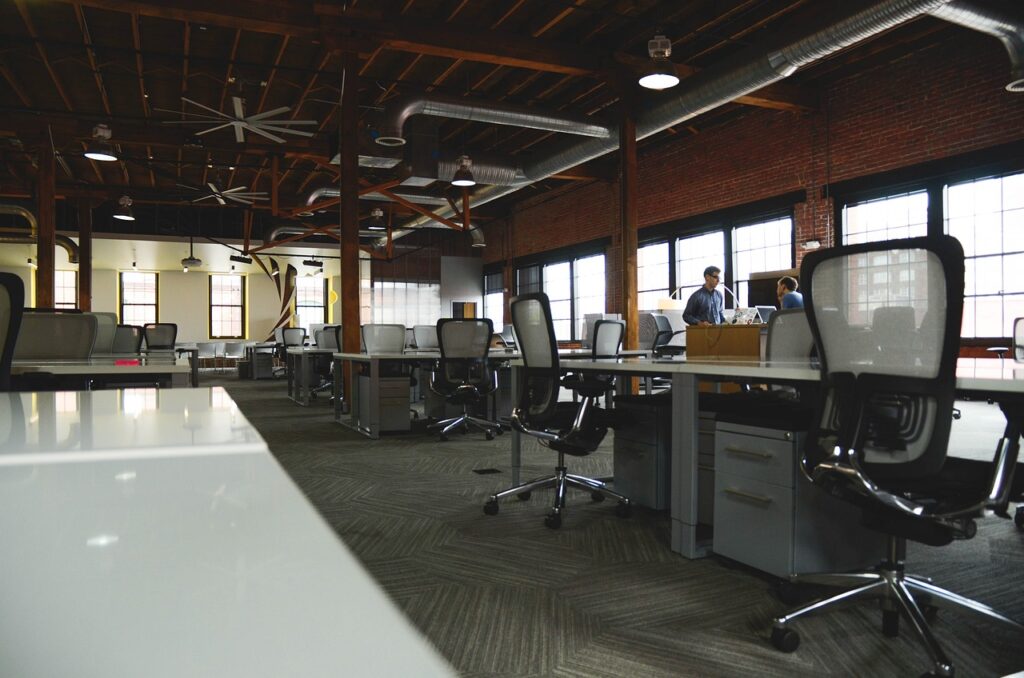
NRW is the right location for any company, but especially for international companies that want to expand or establish themselves in new markets.
The location has a network of great partners who share their access, resources and knowledge in their respective networks. When it comes to financing, NRW.BANK is one trusted source of funding in NRW.
Beside this North Rhine-Westphalia is becoming an increasingly attractive destination for startup financing! According to the EY Startup Barometer Germany from July 2023 (EY Startup - EY Startup-Barometer Germany – July 2023), NRW ranks third in the number of financing rounds nationwide behind Berlin and Bavaria, with 13% of all financing rounds in Germany taking place in NRW. Even more impressive, NRW is one of the few federal states that has increased the number of financing rounds in the first six month of 2023 compared to the previous year. Additionally, in terms of financing volume, NRW ranks a strong fourth behind Berlin, Bavaria, and Hamburg. These figures are a testament to the growing ecosystem for startups in North Rhine-Westphalia and the state's commitment to investing in innovation.
The location also offers several organizations such as the Digi.Hubs NRW, Startercenter NRW, InsurLab Germany and the Startup Region_OWL. These organizations cover all areas of founding and further development.
Especially the network of local chambers of industry and commerce (IHK) in Germany is an important partner of the German economy and offers a wide range of services and advice for local companies.
Even in times of crisis, the state has shown that innovation is maintained through support.

The basis for the success of industry was already laid in Germany in the course of the Industrial Revolution in the coal-rich region of North Rhine-Westphalia. The economic success of that time has shaped NRW to this day.
NRW as a region has set itself the goal of being a pioneer in the fields of technological innovation for industrial solutions in the future.
NRW is also one of the few locations in the world that still has a complete industrial value chain. Characteristic is the unique mix of specialized small and medium-sized enterprises to large medium-sized enterprises and large companies. These companies are united by a high degree of internationalization, ranging from the basic material industries to specialized suppliers and large system providers in leading markets with strong growth.
NRW - Business location figures
Main facts about NRW as a business location
- 18 million inhabitants (21,5% of Germany)
- 710,000 small and medium-sized enterprises (KMUs)
- every fourth market leader comes from North Rhine-Westphalia
- In 2022, 20.5% of the gross domestic product was generated in NRW with € 793.8 billion
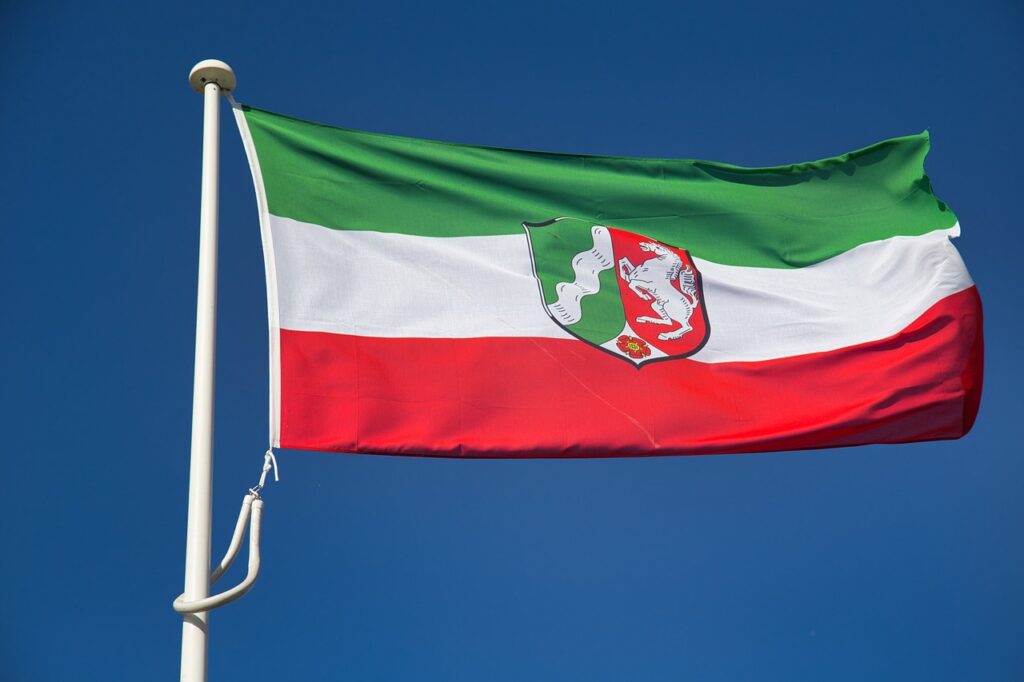
Detailed facts about NRW as an industrial location
NRW has already attracted 20 percent of all startups operating in Germany and has delivered even more radical innovations to the local industry, enabling local companies to take full advantage of the practical knowledge and modernization of the startup scene.
An example of such a radical innovation is the field of nanotechnology. Already 22% of German nanotech companies have established themselves in NRW, as well as 28% of all microsystems and technology companies.
In addition, 25,000 ICT companies have already established themselves in NRW. They generated almost a third of all IKT revenues generated in Germany, amounting to more than 103 billion euros.
NRW - From pioneer to expert in the field of Industry 4.0
As the industrial heart of the continent and Germany, NRW is home to a truly broad industrial customer base, encompassing everything from chemicals and mechanical engineering to electronics and electrical engineering. So there is a niche for everyone to drive and expand their own business. In addition to the potential German industrial customer base in NRW, the state also offers quick access to over 160 million people within a 500 km radius, who have a purchasing power of around 3.5 billion euros.
NRW offers immense opportunities for all companies and start-ups that want to contribute to innovative industrial solutions and make the fourth industrial revolution not only a reality, but also a success story.
In order to network processes along the value chain, the future belongs to technologies such as IT platforms, digital twins and machine learning.
In order to further expand and improve processes, start-ups benefit from the leading research and educational institutions in NRW, for example. They offer young and innovative companies an ideal breeding ground to test and further develop their ideas. They benefit from the exchange between scientific findings and practical needs and applications. These research institutions include the Fraunhofer Institutes such as Fraunhofer FIT or the Centrum Industrial IT (CIIT e. V.).
NRW is also a particularly attractive location due to current developments in the field of AI.
One player in the region that is committed to the advancement of artificial intelligence is KI.NRW. In cooperation with local players from politics, civil society, business and science, KI.NRW is actively using AI. One such program is the application of AI in hospitals or in mobility, which is not only changing industries but also creating smart cities.
These advances are also one reason why NRW is already a leader in language mode research and machine quantum learning.

NRW - Progress through education
There are currently over 750,000 students in NRW studying at one of the 68 universities in the region, such as TU Dortmund University, Ruhr University Bochum or RWTH Aachen University. Around 27% of these students study at universities of applied sciences, which guarantees a well-trained workforce.
NRW - Growth-promoting environment
Founders have many opportunities to exchange ideas with like-minded people and potential business and cooperation partners. Numerous advisory services and accelerator programs in NRW offer support.
We present just a few of them here.
Dig. Hubs NRW (Aachen, Bonn, Düsseldorf Rheinland, Münsterland, ruhrhub)
With its Startup Fellowship and Accelerator Program, the Digital Hubs support startups and intrapreneurs with growth potential in networking with universities, established companies and investors. The scaling program Scaleup.NRWsupports high-growth start-ups from North Rhine-Westphalia.
Startercenter NRW
Initiated by the IHK, the Chambers of Crafts and the municipal economic development agencies, 75 starter centers support founders with information, advice and training. The formalities can also be handled flawlessly with the help of the experts.
InsureTech is a major topic in Cologne. Founders from the fields of e-payment, blockchain, IoT, e-health, virtual reality and big data meet here. The transfer of knowledge from universities into practice is promoted.
Startup Region OWL
The network brings together founders and entrepreneurs from East Westphalia-Lippe. Initiated by the Founders Foundation Bielefeld and supported by the state government, the region wants to make its attractive start-up ecosystem known beyond the regional borders.
A general overview of the startup ecosystem can be found here: https://startups.nrw/
The state is supported by NRW.BANK when it comes to business development. This advises start-ups on funding and grants suitable loans if required. Different funding programs are specialized for different industries. Real experts will find a tailor-made financing program for the respective start-up.
Even during the coronavirus pandemic, the state of NRW has placed particular emphasis on preserving start-ups. In the first edition of the corona aid program, NRW.BANK granted a total of EUR 21.6 million to 112 start-ups, which meant an average amount of just under EUR 193,000. This coronavirus aid consisted of convertible loans with a term of six years and an interest rate of 6%, which are deferred until maturity or conversion. No collateral was required for the convertible loans.
NRW - The overall package for start-ups in industry
NRW is the right location for any company, but especially for international companies that want to expand or establish themselves in new markets.
The location has a network of great partners who share their access, resources and knowledge in their respective networks. When it comes to financing, NRW.BANK is one trusted source of funding in NRW.
NRW has the largest share of foreign direct investment among all federal states. Almost every third euro invested from abroad flows to NRW. Actors such as NRW. Global Business attracts foreign direct investments to the region.
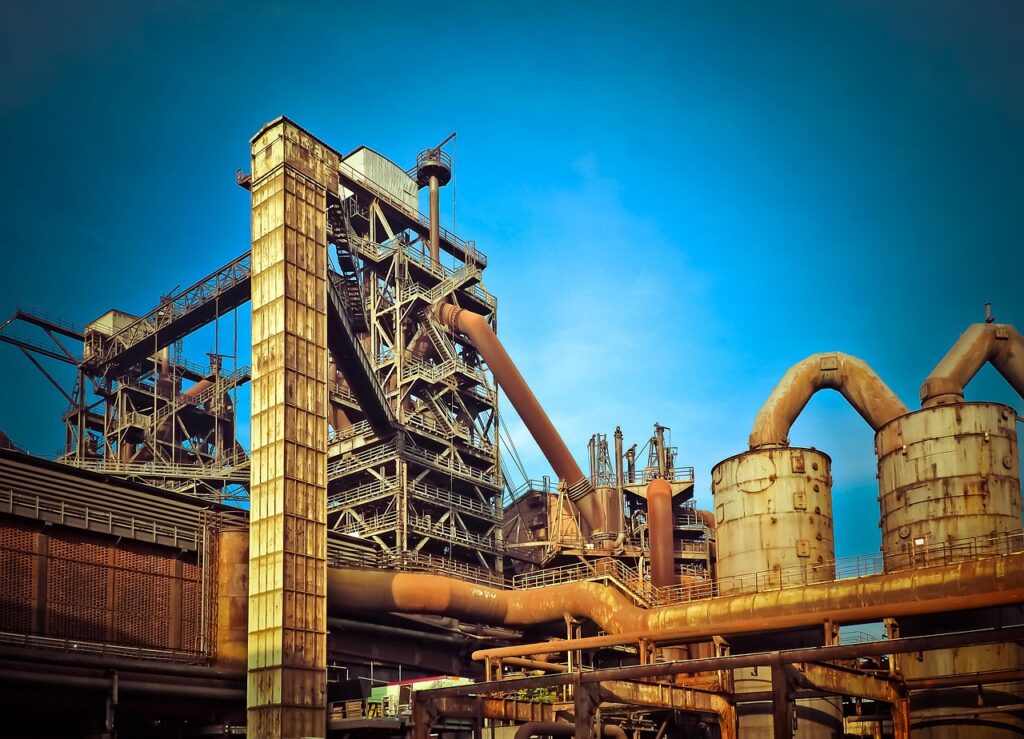
Beside this North Rhine-Westphalia is becoming an increasingly attractive destination for startup financing! According to the EY Startup Barometer Germany from July 2023 (EY Startup - EY Startup-Barometer Germany – July 2023), NRW ranks third in the number of financing rounds nationwide behind Berlin and Bavaria, with 13% of all financing rounds in Germany taking place in NRW. Even more impressive, NRW is one of the few federal states that has increased the number of financing rounds in the first six month of 2023 compared to the previous year. Additionally, in terms of financing volume, NRW ranks a strong fourth behind Berlin, Bavaria, and Hamburg. These figures are a testament to the growing ecosystem for startups in North Rhine-Westphalia and the state's commitment to investing in innovation.
Especially the network of local chambers of industry and commerce (IHK) in Germany is an important partner of the German economy and offer a wide range of services and advice for local companies.
Even in times of crisis, the state has shown that innovation is maintained through support.

From the Start.up! Germany Tour to successful expansion - Sensoneo seizes the opportunity to be present in Germany
It's that time of year again - the Start.up! Germany Tour is going into its next round, offering young companies from all over the world the opportunity to network with investors, network partners and potential customers from Germany. To give you an exclusive insight into the tour, we interviewed Martina Susova from Sensoneo, PR & Communication Manager, one of the start-ups that took part in our 2019 Start.up! Germany Tour.
Martina, first of all, give us some insights about you and Sensoneo.
I got to know the start-up Sensoneo in 2019, when I accompanied them to the Start.up! Germany Tour 2019 as a representative of the German Chamber of Commerce (AHK). I was already convinced of the founding idea and was sure that the Start.up! Germany Tour was a unique opportunity for Sensoneo. When the founders Martin Basila and Andrea Basilova asked me this year if I would like to work for Sensoneo as PR and Communications Manager, I was immediately convinced.
At Sensoneo, we offer innovative waste management solutions and use state-of-the-art technology to help municipalities manage their waste more effectively and efficiently, thereby reducing their environmental impact. The first idea for Sensoneo came in 2014, when the founders developed the first prototype of a sensor and the software solution. Since then, we have reached many milestones and successfully implemented more than 500 projects in over 8 countries. Recently, we even received the "Energy Globe Award" for our innovative solutions in the field of waste management with our unique software system for deposit return systems. This is of course a special honor for us. We are also currently building the world's largest intelligent waste system, which will be commissioned in Madrid later this year.
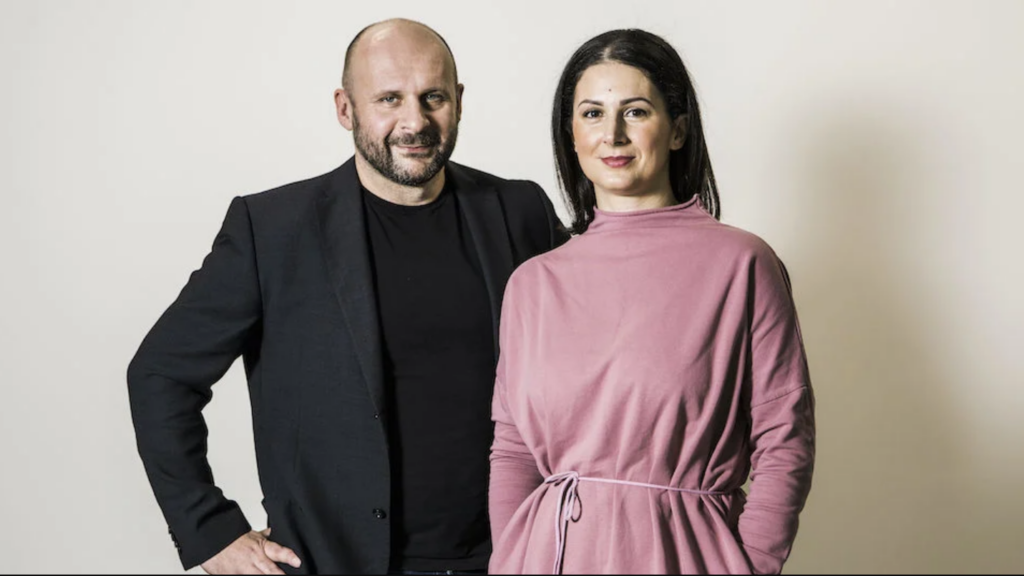
And now to the Start.up! Germany Tour and your participation in 2019. What was the background of your participation and what added value did the tour bring you?
Participating in the Start.up! Germany Tour was a great opportunity for Sensoneo to meet key stakeholders such as investors and potential customers and to market itself. As a young company, the tour provided us with an excellent opportunity to further expand our network in Germany. In this context, I would like to emphasize the B2B matchmaking, which brought us together with relevant stakeholders in the field of factory waste management. This also shows how intensively the IHK engages with its participants in the run-up to the event and invites relevant contacts in order to offer the start-ups real added value. In this way, we were able to lay the foundation for new partnerships and establish contacts with relevant multipliers in Germany. We are still in close contact with many of them and are excited to see what the future will bring!
Can you give us a brief outlook on your future plans?
We see a lot of potential in Germany and want to expand our presence. Especially to better serve our existing customers in Germany. The Start.up! Germany Tour has already given us the opportunity to look at some locations in NRW, and we now want to focus more on that. Of course, this also goes hand in hand with our goal of establishing ourselves as the leading provider of factory waste management in Germany. But we also have big plans on a global scale and want to continue to roll out our solutions for intelligent waste management.
Finally, a question that may be of interest to many of our readers. What advice would you give to other founders who want to participate in the Start.up! Germany Tour?
If you want to be more present in Germany as a founder, the Start.up! Germany Tour is definitely the way to go. The tour is an excellent opportunity to network with key stakeholders and build relationships that are very important for building a business. Long-term relationships and networks are especially important, and you can count on them when you need them. Founders should be open to the great opportunities the tour offers and see it as an opportunity to enter the market.
